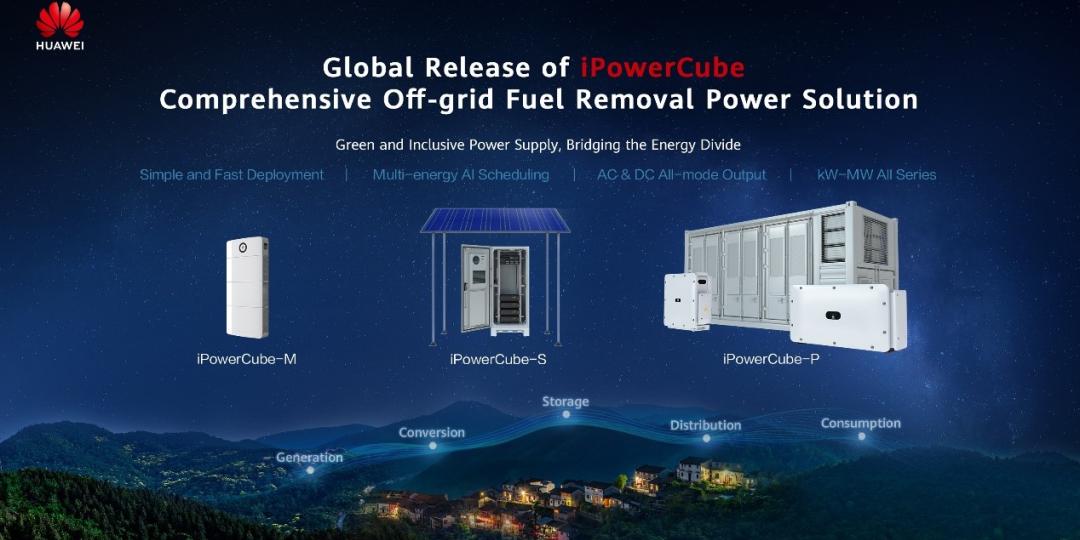Peng Jianhua, the president of Site Power Facility, Huawei Digital Power Technologies, recently released the company's iPowerCube to a global audience. The system is described as being a "full series of comprehensive off-grid fuel removal power solution". Serving as an inclusive power supply in all scenarios, the solutions provide cost-effective, green, and reliable power for people's livelihood and industrial production in off-grid and unreliable grid areas, helping bridge the energy divide.

Peng said electricity supplies are unbalanced around the world. Currently, about 800-million people are living in mountainous areas, islands, deserts, and other regions have no access to grid power. In these regions, a huge number of diesel generators (DGs) are used for power generation. There are more than 50-million DGs worldwide. The cost of generating electricity by diesel is several times higher than that of grid power, and DGs are highly polluting. One kilogram of diesel fuel will generate 3,18 kg of carbon emissions. In addition, DGs are costly, difficult to maintain, and noisy, which seriously affects the normal life of residents and restricts the local economic development. With advances in technologies, the cost of photovoltaic (PV) and energy storage decreases. Replacing DGs with solar energy to achieve low-cost and green inclusive power supply becomes a reality.
Huawei’s comprehensive off-grid fuel removal power solution, iPowerCube, integrates power electronics technologies and digital technologies to streamline energy and information flows. They use PV and energy storage to replace DGs, meeting the power supply requirements of large, medium, and small-scale power consumers. Compared with traditional solutions, iPowerCube solutions feature simpler installation, faster deployment, and lower cost, making iPowerCube more applicable to areas with no or poor grid power.
Large-scale off-grid fuel removal solution iPowerCube-P
Provides megawatt-level power supply capability and applies to industrial production scenarios such as mines, factories, and campuses, as well as livelihood scenarios such as large villages, islands, and resorts. Compared with the traditional AC coupling solution, the iPowerCube-P uses the DC coupling architecture, which reduces the number of energy conversion times, improves the efficiency, reduces the investment, and lowers the LCOE.
In Cameroon, over 25 MW PV plants and 60 MWh energy storage systems adopt the Huawei off-grid solution, powering 350 remote villages and benefiting about 50 000 households with approximate 300 000 residents.
Medium-scale off-grid fuel removal solution iPowerCube-S
Provides 100 kW-level power supply capability and applies to livelihood scenarios such as small villages and islands as well as industrial production scenarios such as oil and gas wells, checkpoints, and transportation stations. Compared with the traditional split-type solution, Huawei iPowerCube-S adopts pre-integration and does not require distribution network reconstruction, which shortens the deployment period and reduces the investment.
In Zhuhai, Huawei iPowerCube-S solution is used to replace the original DG and supply power to the professional equipment and living facilities of the ship navigation station on the island. In this way, the DG is not required. The LCOE is reduced by 60%, the DG-related cost is cut by CNY220 000 each year, and 25 t of carbon emissions are avoided.
Small-scale off-grid fuel removal solution iPowerCube-M
Provides 10 kW-level power supply capability and applies to residential scenarios (such as apartments with no/poor mains power supply and rural villas) and industrial and commercial scenarios (such as shops, restaurants, and business outlets). Compared with the traditional solution with combined gasoline generator and batteries, Huawei iPowerCube-M solution features more flexible deployment, ultra-quiet design, higher reliability, and lower LCOE.
Win-win cooperation: Huawei Site Power joins hands with customers to promote green development. In the future, Huawei Site Power will stick to the strategy of openness and cooperation, and intensify collaboration with customers, partners, industry organizations, and standard organizations in terms of technologies, products, and industry to promote green development, bridge the energy divide, and build a low-carbon society.
Contact Huawei, www.huawei.com















